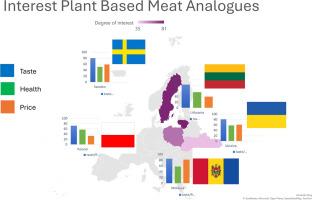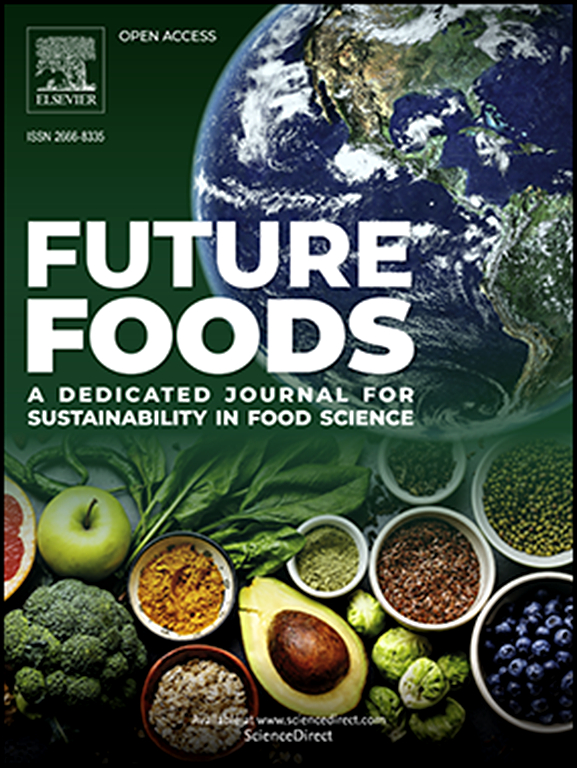在向植物性饮食过渡的过程中。瑞典、立陶宛、波兰、乌克兰和摩尔多瓦的情况
IF 8.2
Q1 FOOD SCIENCE & TECHNOLOGY
引用次数: 0
摘要
多吃植物性食物、少吃动物性食物的饮食对环境的影响较小,并能改善公众健康。然而,并不是所有的消费者都愿意减少肉类消费。一个挑战是了解消费者对减少肉类消费和用植物性类似物代替肉类的态度。本研究旨在调查瑞典、波兰、立陶宛、乌克兰和摩尔多瓦消费者对肉类类似物消费/生产的态度。该调查是通过在线问卷进行的。来自瑞典、立陶宛和波兰的参与者(p <;0.05)比来自乌克兰和摩尔多瓦的参与者对食用肉类类似物更感兴趣,尽管在所有国家都发现了极端的参与者,从0分到100分。总的来说,所有国家的参与者都认为肉类类似物的健康和美味是重要的因素。来自所有参与国家的参与者主要反对在植物性类似物的名称中使用“肉”一词,并建议新名称包括“植物”一词。本研究的结果有助于更好地了解瑞典、立陶宛、波兰、乌克兰和摩尔多瓦向植物性饮食过渡的障碍和驱动因素。本文章由计算机程序翻译,如有差异,请以英文原文为准。

In the transition towards plant-based diets. The case of Sweden, Lithuania, Poland, Ukraine and Moldova
A diet rich in plant-based foods and lower in animal foods is associated with a lower impact on the environment and improved public health. However, not all consumers are willing to reduce meat consumption. A challenge is to understand consumer attitudes towards the reduction of meat consumption and the replacement of meat with plant-based analogues. The present study aimed to investigate the attitudes toward the consumption/production of meat analogues among consumers in Sweden, Poland, Lithuania, Ukraine and Moldova. The survey was conducted by an online questionnaire. Participants from Sweden, Lithuania and Poland were significantly (p < 0.05) more interested in eating meat analogues than participants from Ukraine and Moldova, although extreme particiants were found in all countries, from those scoring 0 to those scoring 100. Overall, the healthiness and tastiness of meat analogues were considered as important factors by the participants from all countries. The participants from all participating countries were mainly negative to the use of the word “meat” in the names of plant-based analogues, and suggestions for new names included the word “plant”. The results from the present study contribute to a better understanding of the barriers and drivers of the transition towards plant-based diets in Sweden, Lithuania, Poland, Ukraine and Moldova.
求助全文
通过发布文献求助,成功后即可免费获取论文全文。
去求助
来源期刊

Future Foods
Agricultural and Biological Sciences-Food Science
CiteScore
8.60
自引率
0.00%
发文量
97
审稿时长
15 weeks
期刊介绍:
Future Foods is a specialized journal that is dedicated to tackling the challenges posed by climate change and the need for sustainability in the realm of food production. The journal recognizes the imperative to transform current food manufacturing and consumption practices to meet the dietary needs of a burgeoning global population while simultaneously curbing environmental degradation.
The mission of Future Foods is to disseminate research that aligns with the goal of fostering the development of innovative technologies and alternative food sources to establish more sustainable food systems. The journal is committed to publishing high-quality, peer-reviewed articles that contribute to the advancement of sustainable food practices.
Abstracting and indexing:
Scopus
Directory of Open Access Journals (DOAJ)
Emerging Sources Citation Index (ESCI)
SCImago Journal Rank (SJR)
SNIP
 求助内容:
求助内容: 应助结果提醒方式:
应助结果提醒方式:


